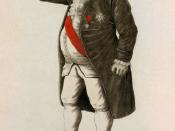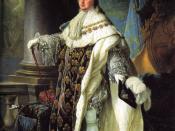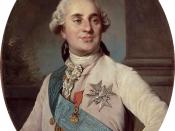In 1789, France was under a revolution. It was ruled by absolute monarchy for centuries. Unfairness between Estates started to frustrate the people at the bottom of France. The French government was 4000 million livers in debt (Christopher Hibbert 1980 p.14). Besides the partial blames that Louis XVI deserved, the situation was quite out of his control. There were many other reasons that lead to this revolution and every single problem was connected with each other. The most important short term factors were the bankrupting of government and the Famine. As for the most important long term factors were the heavy taxes and the enlightenments. Though Louis XVI was partially responsible for the French Revolution, it wasnÃÂt his entire fault, he just happened to be the scapegoat of some wrong deeds done by others.
Louis XVI was famous for being weak and indecisive (Peter Mantin 1992 p. 5) and that was the main problem of his running of the country.
He was popular and beloved at first by all people of France because of his kind-hearted and compassionate personality, but hated later as his weakness and conservatism in politics and economics slowly appeared (Christopher Hibbert 1980 p. 3). He was too weak that even the 1st and 2nd Estates tried to control over him and he wasnÃÂt able to do strong decisive actions (Christopher Hibbert 1980 p. 3). He even preferred personal hobbies to politics interests (Peter Mantin 1992 p. 4). The Aristocrats and the Church refused to help him out with money respectively in 1787 and 1788 when the country was in a financial crisis (Mr A J Field 2007 Schoolhistory.co.uk). At last, Louis XVI lost all control over his troop and the people of France and was in a passive position afterwards. All these nonalignment between estates and...


